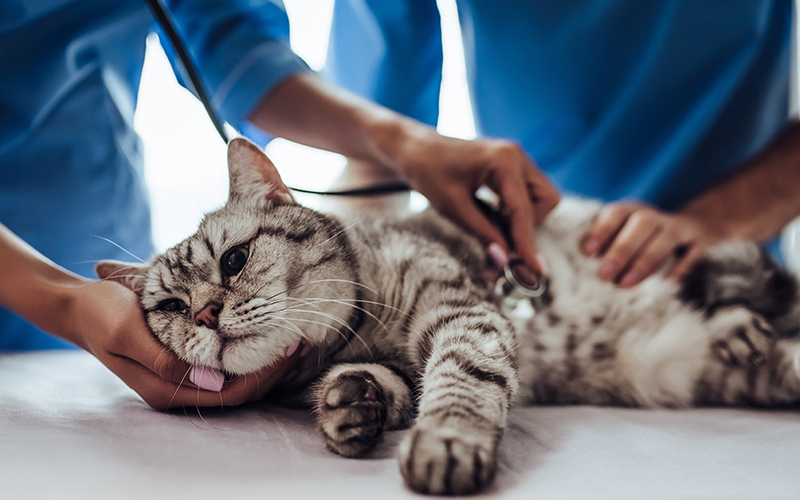Heart Murmurs in Your Dog or Cat: A Pet Health Care Guide

Learning that your dog or cat has a heart murmur can be frightening for any pet owner. However, understanding exactly what causes a heart murmur will help you understand the next steps to take for your pet.
- A heart murmur is an abnormal swishing noise in your pet’s heart
- It is diagnosed by your primary care veterinarian or cardiologist by using a stethoscope
- The loudness of the heart murmur does not necessarily correlate with the severity of the heart disease
If your pet is diagnosed with a heart murmur, there is no reason to panic. Some soft heart murmurs are benign or harmless and may go away on their own, particularly in puppies and kittens. The only way to know the extent of your pet’s condition is to work with your veterinarian and/or a Veterinary Cardiologist (a specialist) to determine the cause of the murmur and the potential severity of the heart disease. Additional diagnostic testing may be required.
What might cause a heart murmur in pets?
Some of the common causes of heart murmurs in dogs and cats include:
- Leaky heart valves secondary to age (most common in small breed dogs)
- Thickening of the heart muscle (most common in cats)
- Weakening of the heart muscle (most common in large breed dogs)
- Congenital (born with at day 1) heart defects in puppies and kittens
- There are many different types of heart defects. Some can be concerning, and others require no treatment at all.
Not all dogs and cats diagnosed with a heart murmur have symptoms; however, not all dogs and cats that suffer from heart disease have a heart murmur. Therefore, your primary care veterinarian and/or Veterinary Cardiologist will use your pet’s physical exam findings and history to decide when and which additional tests or treatments are required.
What are the signs of cardiac disease?
Signs of cardiac disease in dogs and cats can include:
- Difficulty breathing
- Rapid shallow breathing
- Cough
- Abdominal (stomach) distention
- Inability to exercise/weakness
- Gray or blue gums
- Collapse or fainting
- Open mouth breathing and/or limb paralysis in cats
If you pet exhibits one or more of the above symptoms, please contact your primary care veterinarian or cardiologist as soon as possible as these signs could indicate an emergency
How is heart disease diagnosed?
If your primary care veterinarian hears a heart murmur in your dog or cat, they may refer you to a board-certified cardiologist to have an echocardiogram (ultrasound of the heart) performed. This test is the gold standard for definitive diagnosis of the cause of a heart murmur. The results of the echocardiogram will help the cardiologist determine what medications may be required to treat your pet.
How is heart disease treated?
Treatment is designed to relieve the issues associated with heart disease related to the murmur. Some dogs and cats with heart murmurs may live normal lives and never require treatment. Other pets with more severe heart disease will benefit significantly from treatment that can range from oral medications to surgery. However, surgery is not a typical option in veterinary cardiology except for a few congenital heart defects that can be fixed by an operation. The treatment plan for your pet will be designed to improve your pet’s quality of life as well as extend the time you have together. Keep in mind that a heart murmur is only a clinical finding – not an absolute diagnosis of disease in your pet.
Edited by:
Bill Tyrrell, DVM, DACVIM (Cardiology)
April 2020
Articles by Specialty
- Cardiology (19)
- Large Animal Internal Medicine (23)
- Neurology (17)
- Oncology (21)
- Small Animal Internal Medicine (29)
Articles by Animal
- Cats (35)
- Dogs (52)
- Farm Animals (5)
- Horses (12)
